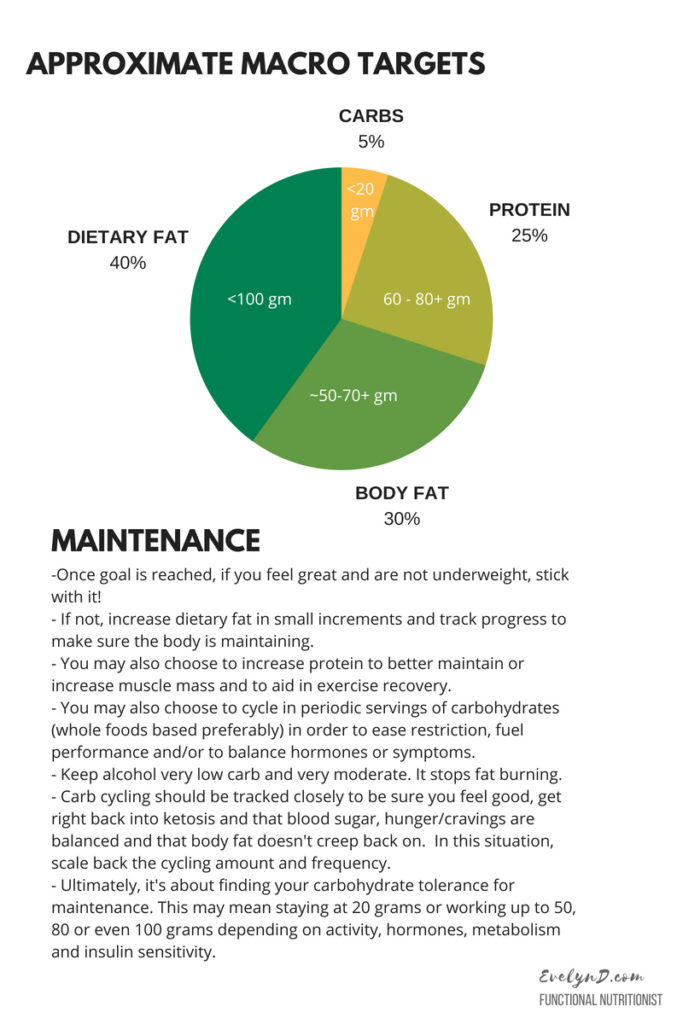Sometimes, we need to learn things the long, hard and slow way. That certainly is the case with my Keto journey (still on it btw!). My latest realization is that despite what many Keto and Fasting experts believe and teach, for many of us (not all); calories do indeed matter if you’re working on fat loss – especially if what you’re doing isn’t really getting the results you desire.
It’s cellular biology and biochemistry 101.
This isn’t a discussion about body acceptance, self love or a diss’ against the ‘Health at Every Size’ movement. I love and support these movements 100%.
If you’re happy with where you are:
YES!!!! Keep going, Woman! Own that!
This conversation is for those of us who simply want to lose excess body fat because we don’t feel or move comfortably with the extra fat – and/or, we don’t like how our clothes feel, and/or, the extra fat is creating more inflammation or health risk.
There is nothing wrong with wanting a leaner, healthier body!
You can’t fake body acceptance or suppress your true feelings and desires. God knows I’ve tried. All it takes is one bad picture where I’m shocked at the difference between how I thought I looked vs. how I actually look – to send me spiraling into a pseudo-depression.
On my Keto/Food Flow journey, here’s where I missed (or was in denial about) something very important:
If we want to lose body fat, many of us can’t over consume calories from any of the macronutrients – including dietary fat. PERIOD.
Simply put, if you’re practicing a Keto/Low carb approach to eating – and you’re eating or drinking loads of dietary fat, your body has no need to dip into it’s own fat stores for fuel.
Not only that, if you’re eating more than your metabolic needs (and needs may be lower in menopause AND with hypothyroid disease), you will increase stored body fat and cause more stress and inflammation in the body! A total lose-lose scenario.
In this 3 part series, I will share with you what I’ve been learning and practicing – based on the scientific evidence and teachings from the likes of Dr. Stephen Phinney, Jeff Volek, PhD, Chris Masterjohn, PhD, Mark Sisson, the Emmerich’s, etc… – revisiting what I thought I knew about body composition and Keto.
This approach is making a difference in my body composition – especially around the belly, arms and hips – and I actually feel better than I had been when I was eating more and carbing up.
(NOTE: If you’re happy with where you are, if you’re working on healing or rebalancing hormones or disordered eating patterns, and/or if you’re not yet fully keto/fat-adapted – focus on healing or fat adaptation first – THEN you can start tweaking.)
When I was eating more fat calories on Keto, I was pretty consistently MAINTAINING my weight and body composition. I’d go up a bit and back down and I definitely felt stuck. And stuck, sucks – to be blunt.
I’ve been “Keto-adapted” (aka Fat adapted) for some time, so I felt really good – brain, mood, digestion, appetite and energy wise. My hormones, exercise, sleep and stress were/are finally well balanced, but I was not losing any weight (or body fat) eating as much as I was – which wasn’t excessive in terms of metabolic rate calculations, but it was too much for my body – which inhibited lipolysis – aka: cancelled out my ability to burn fat.
I usually don’t track calories or macros, but in the spirit of putting my detective hat on, I did for a short time. I found that I was naturally eating well within normal range – about 1500-1800 calories per day and under 50 NET carbs (this means subtracting the fiber from my total carbs – my carbs came mostly from non-starchy veggies and nuts). I’d eat on the higher-end calorically on Crossfit days and drink a little more Dry Farms wine or carb-up a bit on weekends. For me, this was perfect for maintaining – but not for fat loss.
The advice for women in popular Keto circles is to just eat to satiety, make sure your’e eating enough and when in doubt, add more fat. I LOVE this – I really do, but when I do that, it doesn’t get me anywhere body composition wise. It feels good – very free food-wise – but not so free body composition-wise. Do you see how too much freedom in one area, can reduce freedom in another? This is the Universal Law of Compensation.
Then the question becomes, what do I want more? Some of you may just want the food freedom – I LOVE, SUPPORT and TOTALLY RESPECT that! I get it too… I have to say, I’ve spent the last year plus there. But my shorts were tight last month and that bothered me.
Now they’re not.
…and I love that even more. Especially since what I’m doing food wise, still feels really really good to me. It’s just scaled down a bit, so that I can achieve this better body balance too.
An analogy that comes to mind is when I shop for new clothes (another habit of mine – I love getting new clothes ;)), but when I overdo it, I soon realize I have a dwindling bank account or credit card bills along with an overstuffed closet.
There’s no free ride. It’s like a see saw:
Spend More on Clothes > Have Less Money/More Debt and More Clothes to manage.
Eat More> Increase Body Fat or Stall Fat Loss (and potentially cause more inflammation).
To get that bank account back in the green and have a clear closet (where I can actually find something to wear – which makes me feel more balanced, lighter and less stressed), I need to stop feeding the problem. Maybe not splurge so much or so often next time – donate, reorganize and shop my closet, There’s just more balance when I do, so that I don’t have to pay for it later.
With body composition – the options are similar – Assuming everything else is in balance, I either need to eat less fat so that my body uses it’s own fat or burn more body fat through exercise. I can’t really push too much more with the latter because of my adrenals/hormones, so my best option is to be strategic with my food (and wine) – to NOT overeat and to allow my fat-adapted metabolism to use it’s own body fat instead of dietary fat for fuel. That’s the beauty of Keto and having this metabolic “machinery” of a Fat Burner.
‘Sugar Burners’ (those who rely on glucose for fuel) can’t really do this without other consequences and a heck of a lot more suffering, but ‘Ketonians’ are totally equipped metabolically to use their stored body fat for fuel, so let’s!
Here’s the rough plan, based on the average sized woman. Feel free to experiment with me:
In part 2, I’m going to go into how to build your meals – the practical aspects of doing this and how to deal with hunger while your appetite adapts to this adjustment. I’ll also get into what signs to look for that would indicate that you need to eat more.
If you’re on Facebook, I have a Meal Plan and closed group just to support anyone trying this approach. Join us and ask all your questions over there, if you’re interested.
Stay tuned!





